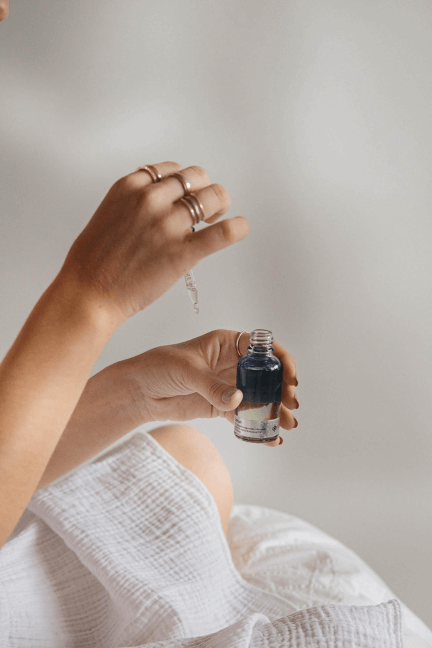You’ve probably seen countless skin products with vitamin C and wondered why it’s there in the first place. This powerful antioxidant has long been celebrated for its immune-boosting properties, but did you know that it’s also a secret weapon in the fight against aging and skin damage? From reducing the appearance of fine lines and wrinkles to brightening dark spots and improving overall texture, vitamin C can work wonders for your complexion. But before you stock up on creams and serums, it’s important to understand the benefits, uses, and potential risks of this popular skincare ingredient. In this article, we’ll explore everything you need to know about vitamin C and how to incorporate it into your daily routine for a radiant, youthful complexion.
Vitamin C is not new to the market and fortunately for us, it has been rigorously tested for its use on the skin. Here are some science-backed properties of vitamin C:
1. It is an antioxidant:
Our skin, the largest organ of our body, protects us daily from environmental stressors such as pollution, solar radiation, and smoking. These stressors fall under the category of “oxidative stress”. Oxidative stress plays a major role in the aging process. Vitamin C is a powerful antioxidant that has been shown to protect the skin against oxidative stress by neutralizing free radical molecules. [1]

2. It can be used for antiaging:
Oxidative stress can cause damage to our skin’s cell membranes and one way this damage manifests is through pigmentation, telangiectasis, course texture, deep wrinkles, and damage to skin elasticity. [2]
Sunscreens, although necessary to protect us against UV rays, are only partially effective in blocking free radicals that are produced from UV exposure. In an animal study by Farris et al, applying 5% of ascorbic acid two hours before UV exposure was found to reduce skin wrinkling. [3] This protective effect of vitamin C has also been studied on humans. A double-blind, placebo-controlled study on 10 subjects studied the effect of 10% vitamin C over 12 weeks. The study showed a significant reduction in photoaging and an improvement in the appearance of wrinkles. [4]
3. It replenishes vitamin E:
Vitamin E is also a lipophilic antioxidant that has a primary role in protecting our skin against oxidative stress and maintaining collagen. Similarly to vitamin C, its levels can be affected negatively after being exposed to the sun. [2] Studies have shown that together vitamins C and E can have a synergistic antioxidant effect, protecting the skin from sun damage. [5]
4. It has an anti-pigmentary effect:

Vitamin C inhibits the activity of an enzyme called tyrosinase. This enzyme is responsible for converting tyrosine into melanin. This means Vitamin C decreases melanin formation and thus is considered to have anti-pigmentation activity. [6] [7]
A study by Hwang et al showed that topical formulations containing 25% of vitamin C significantly decrease pigmentation caused by a skin condition called melasma after only 16 weeks of consistent use. [8]
5. It works synergistically with your sunscreen:
Several studies have shown that vitamin C and sunscreen work synergistically to protect the skin against UV radiation. A randomized controlled trial involving 10 subjects investigated the effect of the topical application of 10% vitamin C and sunscreen on the skin. The results showed that the combination of vitamin C and sunscreen provided a greater degree of photoprotection than sunscreen alone. The study found that the combination of vitamin C and sunscreen reduced the number of sunburn cells, which are an indicator of UV-induced damage to the skin, and decreased oxidative stress in the skin. [9]
Another study by Lin et al. evaluated the effect of a combination of 5% vitamin C and a broad-spectrum sunscreen on skin pigmentation and erythema induced by UV radiation in 30 subjects. The results showed that the combination of vitamin C and sunscreen significantly reduced skin pigmentation and erythema, as well as improved skin hydration and elasticity, compared to sunscreen alone. [10]

Together, these findings suggest that the combination of vitamin C and sunscreen can provide a powerful defense against UV radiation and protect the skin from damage.
That being said the best way to add vitamin C to your skincare routine is to look for products that contain L-ascorbic acid since it is the most biologically active form of vitamin C and the most studied [1]. Other common forms of vitamin C that are available on the market are ascorbyl-6-palmitate and magnesium ascorbyl phosphate (MAP) [11]. Both of these formulations are proven to be more stable than L-ascorbic acid at neutral pH, as opposed to L-ascorbic acid which needs an acidic pH for its stabilization, which makes them good options to use.
These formulations can be found in the form of serums, lotions, and creams.
The appropriate percentage of vitamin C you want to look for should be between 8-20%. Studies have shown that vitamin C concentrations of above 20% do not increase biological activity and might cause more irritation [12].
Ideally, you would also want to combine your vitamin C with a good sunscreen with a coverage of at least 30 SPF or more depending on your skin type.
While the benefits of vitamin C for the skin are clear, it’s important to note that there are some potential risks associated with its use. For example, high concentrations of vitamin C can cause skin irritation or sensitivity, especially in individuals with sensitive skin. It’s also important to choose high-quality products that contain stable forms of vitamin C to avoid any potential negative effects.
Despite these risks, the benefits of vitamin C for the skin far outweigh the potential downsides. By incorporating vitamin C into your daily skincare routine, you can enjoy the many benefits of this powerful antioxidant for a healthy, radiant complexion. Whether you’re looking to reduce the signs of aging, improve the appearance of dark spots, or protect your skin against environmental stressors, vitamin C is an ingredient that should definitely be on your radar.
References
-
3. Farris PK. Cosmetical vitamins: vitamin C. In Draelos ZD, Dover JS, Alam M, editors.
Cosmeceuticals. Procedures in Cosmetic Dermatology.
2nd ed. New York: Saunders Elsevier; 2009. pp. 51–56. [
Google Scholar
] -
Chen L, Hu JY, Wang SQ. The role of antioxidants in photoprotection: a critical review.
J Am Acad Dermatol.
2012;67(5):1013–1024. [
PubMed
] [
Google Scholar
] -
Farris PK. Topical vitamin C: a useful agent for treating photoaging and other dermatologic conditions.
Dermatol Surg.
2005;31(7 Pt 2):814–817. [
PubMed
] [
Google Scholar
] -
Fitzpatrick RE, Rostan EF. Double-blind, half-face study comparing topical vitamin C and vehicle for rejuvenation of photodamage.
Dermatol Surg.
2002;28(3):231–236. [
PubMed
] [
Google Scholar
] -
Lin FH, Lin JY, Gupta RD, et al. Ferulic acid stabilizes a solution of vitamins C and E and doubles its photoprotection of skin.
J Invest Dermatol.
2005;125:826–832. [
PubMed
] [
Google Scholar
] -
Ando H, Kondoh H, Ichihashi M, Hearing VJ. Approaches to identify inhibitors of melanin biosynthesis via the quality control of tyrosinase.
J Invest Dermatol.
2007;127:751–761. [
PubMed
] [
Google Scholar
] -
Kameyama K, Sakai C, Kondoh S, et al. Inhibitory effect of magnesium L-ascorbyl-2-phosphate (VC-PMG) on melanogenesis
in vitro
and
in vivo
.
J Am Acad Dermatol.
1996;34:29–33. [
PubMed
] [
Google Scholar
] -
Telang, P. S. (2013). Vitamin C in dermatology. Indian dermatology online journal, 4(2), 143–146.
https://doi.org/10.4103/2229-5178.110593
-
2. Pullar, J. M., Carr, A. C., & Vissers, M. (2017). The Roles of Vitamin C in Skin Health. Nutrients, 9(8), 866.
https://doi.org/10.3390/nu9080866
-
28. Hwang SW, Oh DJ, Lee D, Kim JW, Park SW. Clinical efficacy of 25% L-ascorbic acid (C’ensil) in the treatment of melisma.
J Cutan Med Surg.
2009;13(2):74–81. -
Lupo MP. Antioxidants and vitamins in cosmetics.
Clin Dermatol.
2001;19:467–473. [
PubMed
] [
Google Scholar
] -
Pinnell SR, Yang H, Omar M, et al. Topical L-ascorbic acid: percutaneous absorption studies.
Dermatol Surg.
2001;27(2):137–142. [
PubMed
] [
Google Scholar
]

 By myulikeadmin
By myulikeadmin



